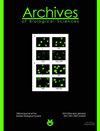Dysregulation of PER3 clock gene and its only pseudogene in colorectal cancer and type 2 diabetes
IF 0.8
4区 生物学
Q4 BIOLOGY
引用次数: 0
Abstract
The period (PER) family genes (PER1, PER2, and PER3) play a fundamental role in regulating the day/night cycle. PER3 has a pseudogene variant, PER3P1 or PER4, whose role and expression pattern is unclear in human health and diseases. This study was performed to evaluate the expression levels of normal PER family members and the PER3P1 pseudogene in colorectal cancer (CRC) and type 2 diabetes (T2D). Blood samples were taken from 50 diabetic patients and analyzed using real-time PCR for quantification of PER3 and PER3P1 expression. Colorectal tumor tissues of 50 individuals were also used to evaluate the expression of PER members. All PER members, including PER3P1, were found to be downregulated in colorectal tumor samples. Blood samples collected from diabetic subjects revealed an opposite expression pattern; both PER3 and its pseudogene were found to be upregulated when compared to the control group. Our results reveal coordination between the expression pattern of PER3P1 and normal PER family genes. Based on our findings and the pathological importance of this pseudogene, it can be suggested that PER3P1 may be one of the key regulators of the molecular clock network and PER family expression. This hypothesis needs to be confirmed by further studies.结直肠癌和2型糖尿病中PER3时钟基因及其唯一假基因的失调
周期(PER)家族基因(PER1、PER2和PER3)在调节昼夜周期中起着重要作用。PER3有一个假基因变体PER3P1或PER4,其在人类健康和疾病中的作用和表达模式尚不清楚。本研究旨在评估正常PER家族成员和PER3P1假基因在结直肠癌(CRC)和2型糖尿病(T2D)中的表达水平。采集50例糖尿病患者的血液样本,采用实时荧光定量PCR定量检测PER3和PER3P1的表达。50例结直肠肿瘤组织也被用于评估PER成员的表达。所有的PER成员,包括PER3P1,在结直肠肿瘤样本中被发现下调。从糖尿病受试者采集的血液样本显示相反的表达模式;与对照组相比,PER3及其假基因均表达上调。我们的研究结果揭示了PER3P1的表达模式与正常PER家族基因之间的协调。根据我们的研究结果和该假基因的病理重要性,我们可以认为PER3P1可能是分子时钟网络和PER家族表达的关键调节因子之一。这一假设需要进一步的研究来证实。
本文章由计算机程序翻译,如有差异,请以英文原文为准。
求助全文
约1分钟内获得全文
求助全文
来源期刊
CiteScore
1.40
自引率
0.00%
发文量
25
审稿时长
3-8 weeks
期刊介绍:
The Archives of Biological Sciences is a multidisciplinary journal that covers original research in a wide range of subjects in life science, including biology, ecology, human biology and biomedical research.
The Archives of Biological Sciences features articles in genetics, botany and zoology (including higher and lower terrestrial and aquatic plants and animals, prokaryote biology, algology, mycology, entomology, etc.); biological systematics; evolution; biochemistry, molecular and cell biology, including all aspects of normal cell functioning, from embryonic to differentiated tissues and in different pathological states; physiology, including chronobiology, thermal biology, cryobiology; radiobiology; neurobiology; immunology, including human immunology; human biology, including the biological basis of specific human pathologies and disease management.

 求助内容:
求助内容: 应助结果提醒方式:
应助结果提醒方式:


